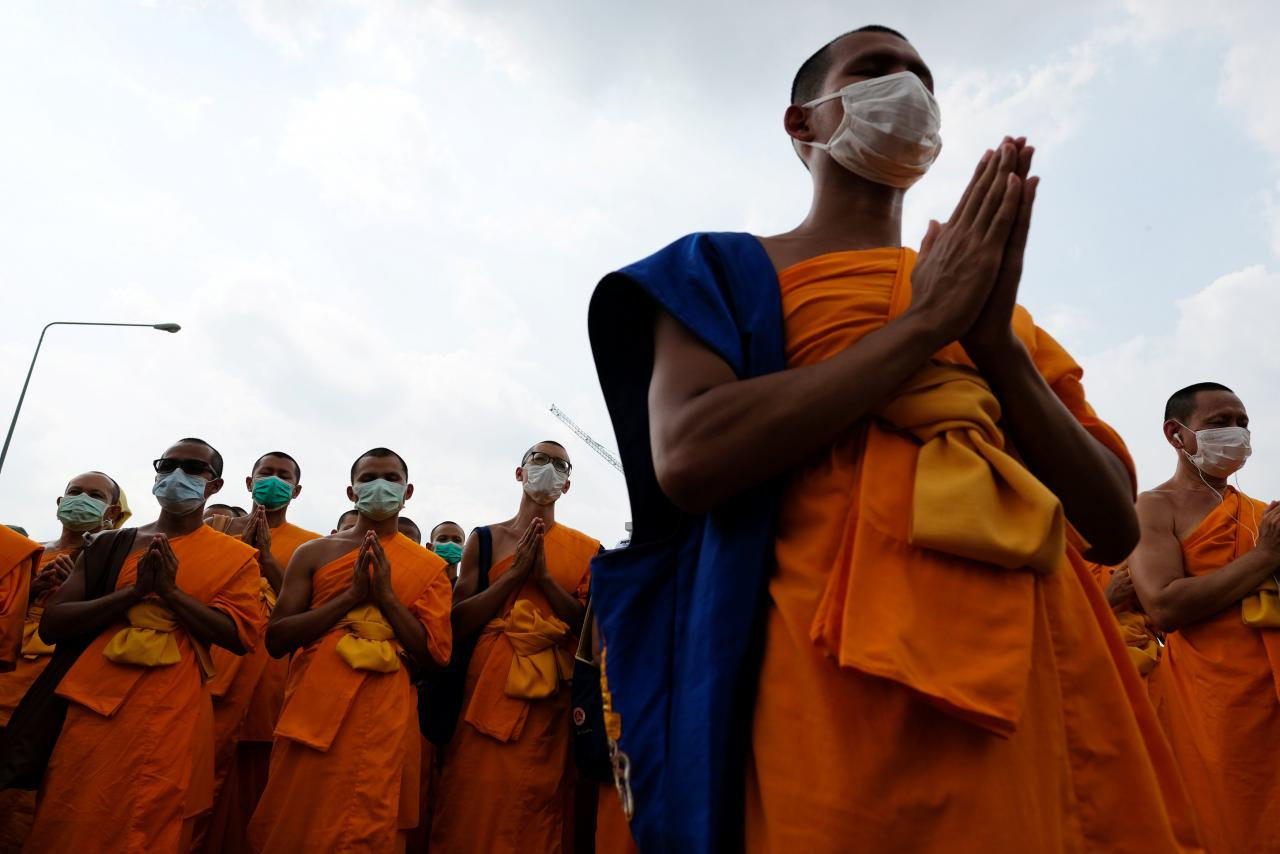
Trend in Sangha’s Role towards Thai Politics in the Next Two Decades
พระมหาหรรษา ธมฺมหาโส (นิธิบุณยากร), รศ.ดร.
Assoc. Prof. Phramaha Hansa Dhammahaso (Nithibunyakorn)
บทคัดย่อ
การศึกษาวิจัยเรื่อง “แนวโน้มบทบาทพระสงฆ์กับการเมืองไทยในสองทศวรรษหน้า (2556-2576)” จากการศึกษาเอกสาร งานวิจัย การสัมภาษณ์ การประชุมกลุ่มย่อย และการสัมมนาในเวทีต่างๆ ทำให้พบบทบาทที่พึงประสงค์ใน 6 ประเด็นหลักคือ (1) บทบาทในฐานะวิศวกรจัดการความขัดแย้งโดยพุทธสันติวิธี (2) บทบาทพระสงฆ์กับการชี้แนะและชี้นำทางการเมือง (3) บทบาทในการพัฒนาพลเมืองของรัฐตามระบอบประชาธิปไตย (4) บทบาทในการใช้สิทธิวิพากษ์วิจารณ์นักการเมืองและนโยบายแห่งรัฐ (5) บทบาทในการชุมนุมเพื่อเรียกร้องความต้องการทางการเมือง (6) บทบาทในการใช้สิทธิเลือกตั้งนักการเมือง
ในขณะที่ชุมชน และสังคมกำลังเผชิญหน้ากับความแตกแยกและแบ่งฝ่ายอย่างร้าวลึกในช่วง 10 กว่าปี บทบาทที่ถือได้ว่าเป็นภารกิจเร่งด่วนของของพระสงฆ์คือการเข้าไปหน้าที่ “วิศวกรสันติภาพ” เพื่อเสริมสร้างความปรองดองให้เกิดขึ้นแก่สังคมไทยตามนโยบายของรัฐบาล และข้อเสนอแนะ คณะกรรมการอิสระตรวจสอบและค้นหาความจริงเพื่อการปรองดองแห่งชาติที่ว่า “บุคลากรทางศาสนาควรเพิ่มบทบาทในการลดความแตกแยก ส่งเสริมสันติภาพ และแก้ไขความขัดแย้งในสังคมโดยสันติวิธี” ฉะนั้น “ทุกฝ่ายควรให้ความสำคัญกับการฟื้นฟูหลักศีลธรรมและจริยธรรม และสนับสนุนให้สถาบันศาสนาเข้ามามีบทบาทในการลดความขัดแย้ง และยุติการใช้ความรุนแรง” โดยการเปิดพื้นที่ให้พระสงฆ์เข้าไปเป็นผู้นำกระบวนการกลุ่มเปิดเวทีพูดคุยเพราะคุณสมบัติเด่นของพระสงฆ์คือ “การเป็นนักฟังที่ดี” (Mindful Listening) เพราะดำรงความเป็นกลางระหว่างผู้ที่ไม่มีส่วนได้ส่วนเสียในกลุ่มต่างๆ
นอกจากนี้ การปกครองในระบอบประชาธิปไตยมีความเชื่อว่า “การปกครองระบอบประชาธิปไตยที่ดีมีจุดเริ่มต้นมาจากพลเมืองที่ดี” พระสงฆ์ถือว่าเป็นพลเมืองของประเทศชาติที่ควรเข้าไปทำหน้าที่ในการช่วยรัฐพัฒนา “คนดี” ให้กลายเป็น “พลเมืองที่ดี” ของประเทศชาติ และของโลก ซึ่งหลักการในพระพุทธศาสนาเอื้อต่อแนวทางในการพัฒนาดังกล่าว ไม่ว่าจะเป็นหลักสังคหวัตถุธรรม หลักสุจริตธรรม หลักคารวธรรม หลักเมตตาธรรม และหลักสันติธรรม ในการพัฒนาพลเมืองอย่างรอบด้านจำเป็นต้องเปิดใจให้มีการพูดคุยและวิพากษ์วิจารณ์กลุ่มคนต่างๆ พระสงฆ์ควรพัฒนาทักษะใน การที่จะสื่อสารทางการเมือง (Political Communication) โดยเข้าใจวิธีการและกระบวนการสื่อสารทั้งระบบตามหลัก SMCR 1 ประกอบด้วย ผู้ส่ง (Source) ข้อมูลข่าวสาร (Message) ช่องทางในการส่ง (Channel) และ 1 ผู้รับ (Receiver) (4) การเปิดใจ (Open Mind) รับฟังจากรัฐ ผู้นำ หรือนักการเมืองด้วยใจที่เป็นกุศล
ในปัจจุบันและอนาคตนั้น การดำเนินกิจการทางการเมืองของพระสงฆ์โดยการชุมนุมเพื่อประท้วงนักการเมืองหรือรัฐนั้น แม้ว่าประเพณีในสังคมไทย พระธรรมวินัย และกฎหมายรัฐธรรมนูญจะเปิดพื้นที่ให้ (ก) พระสงฆ์สามารถดำเนินการประกาศควํ่าบาตรด้วยมติของสงฆ์ ทั้งระดับหมู่บ้านจนถึงระดับประเทศต่อกลุ่มบุคคลที่กระทำผิดต่อพระพุทธศาสนา (ข) ควํ่าบาตรต่อรัฐ หรือนักการเมือที่ดำเนินนโยบายกระทบต่อวิถีวิถีชีวิตของพลเมืองและวิถีธรรมของชุมชน สังคม และศาสนา เพื่อรักษาผลประโยชน์และวัฒนธรรมอันดีงามของสังคมไทย แต่พระสงฆ์ควรระมัดระวังท่าทีการแสดงออกทางกาย วาจา และใจเพราะอาจจะส่งผลต่อความอยู่รอดพระพุทธศาสนาในรูปขององค์กรในระยะสั้น และระยะยาว โดยดำเนินการประท้วงภายใต้เกณฑ์ชี้วัดใน 3 ประเด็นคือ (1) แนวคิด (Concept) (2) เนื้อหา (Content) และ (3) บริบท (Context)
สำหรับแนวโน้มบทบาทพระสงฆ์กับสิทธิการเลือกตั้งในอนาคตขึ้นอยู่ตัวแปร 3 ประการคือ (1) การดำเนินนโยบายของรัฐต่อพระพุทธศาสนาที่ขาดความเข้าใจ และไม่สนับสนุนพระพุทธศาสนาอย่างจริงจัง แม้ว่าประชาชนส่วนใหญ่ของสังคมไทยจะนับถือพระพุทธศาสนาก็ตาม (2) การขาดการตระหนักรู้ของนักการเมืองต่อชาตากรรมของพระพุทธศาสนา ทั้งในเชิงพฤตินัยและนิตินัย (3) การดำเนินนโยบายของศาสนิกและศาสนาอื่นๆ ที่กระทบต่อความรู้สึกของพุทธศาสนิกชน หรือการไม่สามารถที่ป้องกันมิให้ศาสนาหรือศาสนิกของศาสนาอื่นๆ ทำร้าย หรือกระทำการณ์ที่บั่นทอนพระพุทธศาสนาในลักษณะต่างๆ
Abstract
Research into the ‘direction and role of the monastic sangha in Thai politics over the next two decades (2013-2033)’ obtained from various documents, research reports, group forums, and seminars reveals six key functions of the sangha: 1) the role of dealing with social conflict by using Buddhist methods of peace; 2) the role of offering political advice and guidance; 3) the role of developing people in accord with democratic principles; 4) exercising the right to criticize politicians and state policies; 5) the role in gathering together in order to make political requests; 6) the role in exercising the right to vote.
The political gatherings and the deepening rift in society between political factions in Thailand over the past ten years have created an urgent need for the sangha to perform the role of ‘peace engineer,’ in order to foster reconciliation in Thai society. This accords with those government policies and recommendations by independent inquiry committees aiming for national unity, which state: ‘Religious personnel should increase their role in reducing social conflict, fostering peace, and attending to social discord through peaceful means.’ Therefore, ‘Each party should give importance to restoring moral and ethical principles, and support religious institutions to have a role in decreasing conflict and bringing an end to violence.’ This can be achieved by giving the monastic community the leadership in establishing forums for discussion. Essential attributes of the members of the monastic community include being ‘mindful listeners’ and not having personal interests at stake in regard to one party or another.
Moreover, principles of democratic governance state that ‘a good democratic government begin with virtuous citizens.’ The monastic sangha sees it as everyone’s responsibility to help the state develop people in virtue for the welfare of the nation and the world. Many Buddhist teachings are conducive to this development, including the four bases of social solidarity (sangaha-vatthu), the principles of honesty (sucarita-dhamma), the principles of respect (gārava-dhamma), the principles of loving-kindness (mettā-dhamma), and the principles of peace (santi-dhamma). A comprehensive development of the general public requires a healthy discussion and constructive criticism between various parties. Members of the monastic community should acquire skills for engaging in political discussion by understanding and applying the model of communication referred to as SMCR, which includes: needs of the Sender, compatible Messages, compatible Channels, and needs of the Receiver. Furthermore, one should maintain an open mind, by listening to those government leaders and politicians with a wholesome state of mind.
In regard to present and future political activities and demonstrations, the tradition of Thai society, the monastic discipline (Vinaya), and constitutional laws permit the monastic sangha the following expedients: A) with consensus by the wider monastic community, the monks can announce the measure of ‘turning over the almsbowl,’ both on a village and a state level, in order to protest against individuals who violate the Buddhist religion; B) ‘Turn over the almsbowl’ vis-à-vis the state or vis-à-vis those politicians who enact policies having an adverse effect on the lives of the general public or on righteous principles belonging to religion or society, in order to preserve the wellbeing and goodness of Thai society. Sangha members should be careful, however, in how they express themselves by way of body, speech, and mind, because their actions may affect the survival of Buddhist institutions, both in the long term and the short term. Their protests should be performed by using the three criteria of (1) concept; (2) content; and (3) context.
The role of the sangha in regard to voting in future elections depends on three variables: (1) the government through a lack of understanding passes state policy negatively affecting Buddhism, or it neglects Buddhism, even though the majority of Thai people are Buddhists; (2) there is a lack of awareness by politicians of the course and development of Buddhism, both in a factual sense and in a legal sense; (3) adherents of other religious traditions enact policy that is considered hostile by Buddhists, or Buddhists feel they cannot defend themselves against harmful or undermining actions by members of other religious traditions.